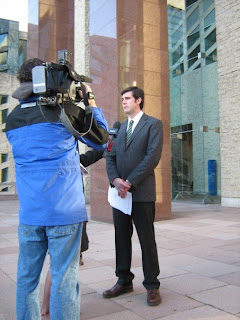A couple of weeks ago, I became involved with the Transit Riders' Union of Edmonton. TRUE is a committee of Edmonton Transit Service riders who are currently researching and developing strategies to improve the quality of public transit in Edmonton.
Yesterday, TRUE issued a challenge to Edmonton's City Council to rely exclusively on transit for the week of November 19-25. Ward 5 Councillor Don Iveson, Ward 4 Councillor Ben Henderson, and Ward 6 Councillors Amarjeet Sohi and Dave Thiele have all accepted the challenge and will join hundreds of thousands of Edmontonians on the bus this week.
By accepting the challenge, it says a lot about these four City Councillors and their commitment to improving public transit, something that is essential in creating an efficient and manageable city as Edmonton grows.
You can read coverage of the media challenge here, here, here, and in Russian here.
Here are some pictures that I took at the media conference on the steps of Edmonton City Hall.
Tuesday, November 20, 2007
edmonton city council transit challenge.
Subscribe to:
Post Comments (Atom)











5 comments:
Kudos to those councillors who have chosen to ride ETS for a week. They can learn how sad the system truly is.
Maybe they will think of a startegy to improving it...
I don't think ETS is all that bad, as far as public transit goes. Sure the LRT could be expanded further, but the bus routes are top notch. For those of us that need to get to downtown in the morning and back out at night (i.e. a lot of working folks), the system works well. Likewise if you need to get to the U of A.
I was surprised to see former bus driver Amarjeet Sohi describe our system as "rather mediocre". I think that does a discredit to his former coworkers and their management and planning teams. Transit is a very complicated issue. There will always be a portion of people mad that they can't instantly be transported from A to B.
However all in all, ETS does a good job. It doesn't need any massive overhaul. Just add some BRT, get that LRT extended, and quit trying to provide service to all these urban sprawl neighborhoods. If you choose to live in what was recently a farmer's field, well I guess you had better find your own way around.
I don't think it's that Edmonton has the worst transit system out there, but I think it leaves a lot to be desired. There is room for major improvements in routes and schedules. This looks to be something that hasn't been addressed in a long time and with Edmonton growing at the rate it is it will be important to make sure that the transit system reflects the needs of Edmontonians.
Councillor Don Iveson looks so much better than Councillor Mike Nickel.
Anoymous has a point when (s)he raises the issue of the urban sprawl neighbourhoods - although I'm not sure about the conclusion.
I moved to Edmonton in August and got around exclusively by Transit until I bought a car a month ago - which I use about once or twice a week. I live downtown, walk the 9 blocks to work and take transit for evenings out in Strathcona etc. Conclusion - whilst not perhaps the world's best, transit in Edmonton is extensive & affordable. The drivers are also, for the most part, polite & helpful (which is a big positive when it comes to attracting new users). As far as I can see the main problem with the Transit is the way the city is laid out, it is much easier to provide usable transit in cities where all the shopping, commercial and entertainment districts are grouped together and where transit is planned into new development.
I think the other main difficulty, related again to the sprawling nature of the city, is the number of routes. Several hundred routes that go once an hour are very difficult to deal with as a user unless you are only using the system to make the daily trip to work. 10 or 15 lines that went once every 5 or 10 minutes in a direct fashion down the main roads would be much more user friendly for most people, even if you had a few blocks to walk at either end. This would however limit access to the system for seniors and the disabled who would have to be catered for in some other way - perhaps by the community buses.
It depends how you envisage the transport future of the city. Is transit purely a social provision for those who cannot drive? or do you eventually want most people to use transit most of the time. Option 1 is currently being achieved. Option 2 requires a wider look at the way the expansion of the city is being managed, the current boom and need for more housing could be a great opportunity to build environmentally sustainable communities.
Post a Comment